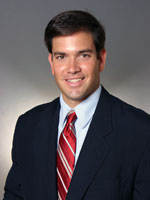Call them Time-savers. On the cover of this week’s edition, the national magazine names Senator Marco Rubio “The Republican Savior” — though at this time last February Time‘s editorial board was looking to Mario Monti, who resigned as Prime Minister in December, to save Europe. (His spot in the magazine’s pantheon was taken in January by fellow Italian Mario Draghi, the current president of the European Central Bank.)
The Florida Senator has been chosen to give the rebuttal to President Obama’s State of the Union speech next Tuesday, and will do so in both English and Spanish. Rubio, who is young and Hispanic, seems to have his eye on running for president in 2016 as the head of a rebranded Republican Party. He’s likely to push immigration reform, a position favored by the party’s corporate establishment but reviled by its base. Beyond that, Minority Leader Mitch McConnell says, expect boilerplate Republican positions:
“Marco’s own experience as the child of immigrants has always informed his belief in limited government and free enterprise, which is why he has helped lead the fight against out-of-control spending and job-destroying tax hikes that continue to hold our economy back and stifle opportunity for millions. He was a natural choice to deliver the Republicans’ alternative to the administration’s reliance on government and debt.”
His campaign funds, however, have come from the usual sources. Private organizations with a Republican/conservative bent poured money into his 2010 Senate campaign; after retirees, they were his second largest source of funds. Of these groups, the top individual contributor, giving nearly $360,000, was the tax-cut focused Club for Growth, a 501(c)4 group (a tax-exempt organization that can lobby and campaign but isn’t required to reveal its donors.) Ex-Senator Jim DeMint’s Senate Conservatives Fund, another Tea Party-associated political action committee, came in third on Rubio’s list. Two wealthy conservative families also made the rankings: Crow Holdings (eighth), which manages the estate of late Dallas billionaire Trammell Crow, and Koch Industries (ninth), run by the billionaire Koch brothers.
Rubio also received big bucks from the finance sector, often from corporate raiders. “Vulture” hedge fund holding company Elliott Management, Rubio’s second largest individual donor, pitched him $121,000. Rubio received $85,800 from multinational investment bankers Goldman Sachs (fourth), while insurance and financial services firm State Farm (seventh) tossed in $36,000. Leveraged buyout specialists Kohlberg Kravis Roberts & Co. (KKR & Co.) (sixth) and Boca Raton’s Sun Capital Partners (13th) appeared on his list, as did LBO master Harold Simmons’s Contran Corporation (17th) and Affiliated Managers Group (19th), another hedge fund company.
Many of the Florida Senator’s contributors were located in the Sunshine State, or at least had headquarters there. These included Palm Beach sugar company Florida Crystals (fifth); Miami construction firm MCM Corporation (11th); Boca Raton’s GEO Group (12th), providing jails and other detention facilities worldwide; Juno Beach electric utility company NextEra Energy (14th); Jacksonville real estate developers Demetree Brothers (15th) and railroad company CSX Corporation (16th); Clewiston sugar company Hilliard Brothers of Florida (18th); and Sumter County retirement community The Villages (20th).
Also in Rubio’s top twenty was the world’s largest advertising company, the WPP Group (tenth).

